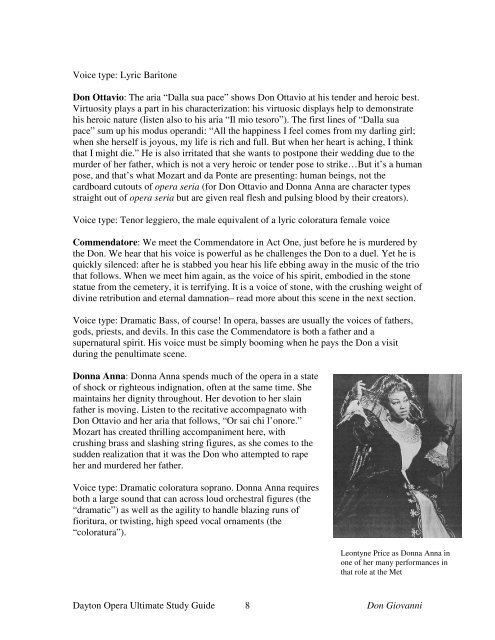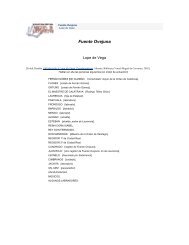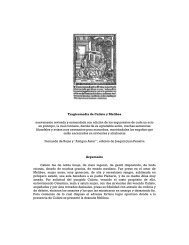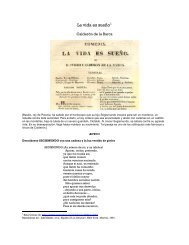You also want an ePaper? Increase the reach of your titles
YUMPU automatically turns print PDFs into web optimized ePapers that Google loves.
Voice type: Lyric Baritone<br />
<strong>Don</strong> Ottavio: The aria “Dalla sua pace” shows <strong>Don</strong> Ottavio at his tender and heroic best.<br />
Virtuosity plays a part in his characterization: his virtuosic displays help to demonstrate<br />
his heroic nature (listen also to his aria “Il mio tesoro”). The first lines of “Dalla sua<br />
pace” sum up his modus operandi: “All the happiness I feel comes from my darling girl;<br />
when she herself is joyous, my life is rich and full. But when her heart is aching, I think<br />
that I might die.” He is also irritated that she wants to postpone their wedding due to the<br />
murder of her father, which is not a very heroic or tender pose to strike…But it’s a human<br />
pose, and that’s what Mozart and da Ponte are presenting: human beings, not the<br />
cardboard cutouts of opera seria (for <strong>Don</strong> Ottavio and <strong>Don</strong>na Anna are character types<br />
straight out of opera seria but are given real flesh and pulsing blood by their creators).<br />
Voice type: Tenor leggiero, the male equivalent of a lyric coloratura female voice<br />
Commendatore: We meet the Commendatore in Act One, just before he is murdered by<br />
the <strong>Don</strong>. We hear that his voice is powerful as he challenges the <strong>Don</strong> to a duel. Yet he is<br />
quickly silenced: after he is stabbed you hear his life ebbing away in the music of the trio<br />
that follows. When we meet him again, as the voice of his spirit, embodied in the stone<br />
statue from the cemetery, it is terrifying. It is a voice of stone, with the crushing weight of<br />
divine retribution and eternal damnation– read more about this scene in the next section.<br />
Voice type: Dramatic Bass, of course! In opera, basses are usually the voices of fathers,<br />
gods, priests, and devils. In this case the Commendatore is both a father and a<br />
supernatural spirit. His voice must be simply booming when he pays the <strong>Don</strong> a visit<br />
during the penultimate scene.<br />
<strong>Don</strong>na Anna: <strong>Don</strong>na Anna spends much of the opera in a state<br />
of shock or righteous indignation, often at the same time. She<br />
maintains her dignity throughout. Her devotion to her slain<br />
father is moving. Listen to the recitative accompagnato with<br />
<strong>Don</strong> Ottavio and her aria that follows, “Or sai chi l’onore.”<br />
Mozart has created thrilling accompaniment here, with<br />
crushing brass and slashing string figures, as she comes to the<br />
sudden realization that it was the <strong>Don</strong> who attempted to rape<br />
her and murdered her father.<br />
Voice type: Dramatic coloratura soprano. <strong>Don</strong>na Anna requires<br />
both a large sound that can across loud orchestral figures (the<br />
“dramatic”) as well as the agility to handle blazing runs of<br />
fioritura, or twisting, high speed vocal ornaments (the<br />
“coloratura”).<br />
Leontyne Price as <strong>Don</strong>na Anna in<br />
one of her many performances in<br />
that role at the Met<br />
Dayton Opera <strong>Ultimate</strong> <strong>Study</strong> <strong>Guide</strong> 8 <strong>Don</strong> <strong>Giovanni</strong>





